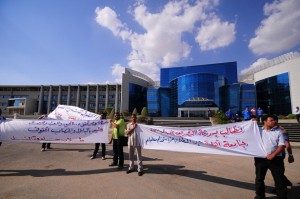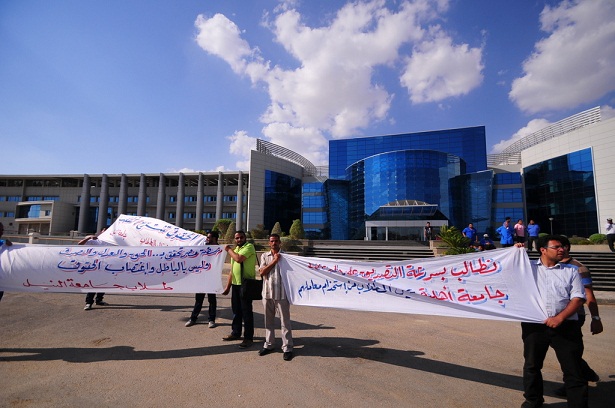
(DNE File Photo/ Hassan Ibrahim)
The Supreme Administrative Court upheld on Saturday a verdict reserving Nile University’s claim over a contested piece of land, ruling on a conflict which has dragged on for more than three years.
Nile University has been fighting with Zewail City of Science and Technology, established by Nobel laureate Ahmed Zewail, for more than two years over a piece of land that both universities claim to be their own.
Saturday’s ruling turned down challenges to a verdict issued in April 2013 submitted by Zewail City. The court also ruled in favour of the return of Nile University students to the contested buildings.
Nile University students welcomed Saturday’s verdict, but remained wary. Nancy Mustafa, a member of Nile University Student Union, noted that this is the third court ruling favouring Nile University, adding that other verdicts were not implemented.
“I don’t see any cause for optimism when we have been left disappointed twice before,” Mustafa said. “We shall see how the current government deals with this verdict.”
In a statement released by Nile University’s Student Union before Saturday’s decision, the students stated that the verdict would test the current government’s respect to the judiciary and its rulings.
Zewail City, meanwhile, stressed in a statement released on Saturday that the recent verdict rules on an urgent level; the substantive level of the case is yet to be ruled on. Sherif Fouad, Zewail City’s spokesman and media adviser, said the verdict “adds nothing new.” It is impossible for Zewail City to implement Saturday’s verdict and take Nile University students into the buildings currently occupied by Zewail City students, he said.
“The harm that will befall Zewail City [should this verdict be implemented] largely exceeds that which will befall Nile University students [should the verdict not be implemented],” Fouad said. “Zewail City is a national project into which millions of Egyptian pounds were pumped; how can we destroy such a project to preserve Nile University?”
Zewail City filed an appeal with the Supreme Constitutional Court objecting to the Supreme Administrative Court’s 2013 verdict. The university argued that the Giza Court, which is a civil court, ruled in favour of Zewail City in 2012. The City called for a ruling on the two conflicting verdicts.
Fatma Serag, one of the lawyers representing Nile University, said earlier that the Giza Court’s verdict is less binding than the Supreme Administrative Court’s since the latter’s verdict is superior to and more recent than the former’s.
The Supreme Administrative Court’s initial April 2013 verdict gave Nile University the right to the disputed land. The ruling also necessitated that Nile University be declared a civil university. The university was recognised under the designation after the issuance of the law governing civil universities in 2009; the recognition is nevertheless yet to be ratified by the president.
Fouad said that the solution lies in ratifying the recognition of Nile University as a civil university and allocating a new piece of land for it to build a new campus, adding that Zewail City is ready to financially contribute. “We are not party to the harm which befell Nile University,” Fouad said, “yet we are prepared to be part of the solution so long as it doesn’t harm us.”
Last week, interim Prime Minister Ibrahim Mehleb met Zewail City’s Academic Chief Sherif Sedqi in an effort to reach a solution to the ongoing crisis with Nile University. During the meeting, Mehleb stressed the importance of swiftly reaching a solution which would preserve the future of all students.
Since the Supreme Administrative Court’s 2013 decision, Nile University students have not yet been granted access to the disputed buildings. Nile University students currently attend their classes at the Smart Village; which they describe as inadequate and lacking of laboratories and workshops. Zewail City accepted 300 students into the contested buildings at the beginning of its first academic year last September.

